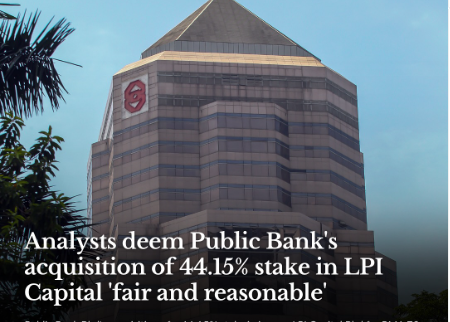Financial circles are buzzing with speculation following LPI Capital Berhad’s decision to sell its minority stake in Public Bank Berhad. In addition to being a legal necessity, the sale, which is estimated to be worth RM940 million ($200M), offers investors the chance to profit from a potentially large special dividend.
This deal comes after Public Bank purchased a 44.15% share in LPI Capital from the late founder Tan Sri Teh Hong Piow’s estate. Regulations mandate that LPI sell its remaining 1.1% stake in Public Bank within a year since it is now regarded as a subsidiary of the bank.
Key Insights on LPI Capital’s Public Bank Share Sale
| Category | Details |
|---|---|
| Company | LPI Capital Berhad |
| Stake Being Sold | 1.1% of Public Bank Bhd |
| Estimated Value | RM940 million |
| Potential Special Dividend | RM1.89 – RM2.36 per share |
| Reason for Sale | Regulatory compliance after Public Bank’s acquisition |
| Stock Rating | “Outperform” by Kenanga IB |
| Potential Impact | Up to 18% special dividend yield |
Could LPI Capital Shareholders Get a Windfall?
Many investors view LPI Capital’s sale of its Public Bank stake as a wise decision, and analysts at Kenanga Investment Bank anticipate a sizable special dividend payout.
- Investors may receive RM1.89 per share, or a 15% dividend yield, if 80% of the sale proceeds are distributed.
- An 18.4% yield, or RM2.36 per share, could be distributed to shareholders if all proceeds are distributed.
In light of these numbers, Kenanga IB has reiterated its “Outperform” rating on LPI Capital, pointing to solid financials and promising future prospects.
The Reasons LPI Capital Doesn’t Use the Money for Purchases
At first, some investors conjectured that LPI Capital might use the money to fund additional acquisitions. Analysts, however, think this is unlikely because Lonpac Insurance Berhad, an insurance subsidiary of LPI, is already among the most lucrative insurers in Malaysia.
The most sensible course of action for shareholders would be a special dividend because any acquisition in the insurance industry would probably be dilutive rather than value-accretive.
The strategic priorities of LPI Capital continue to be sustaining profitability in the cutthroat insurance industry, organic growth, and sound balance sheet management.
Why the Public Bank Takeover Attempt Didn’t Work Out
Public Bank was able to purchase a 44.15% share in LPI Capital, but its attempt to take over the entire business was unsuccessful.
In a mandatory general offer (MGO), Public Bank failed to acquire more than half of LPI’s total shares, falling just short at 49.57%, despite offering RM9.80 per share.
What Caused the Takeover to Failing?
- It’s likely that a large number of institutional investors thought LPI Capital’s shares were worth more than RM9.80.
- The anticipated special dividend payment reduced the appeal of selling shares.
- Several shareholders favored LPI Capital’s independence over Public Bank’s acquisition.
LPI Capital will remain a separate public company for the foreseeable future due to the MGO’s failure.
The Path Ahead for Public Bank and LPI Capital
Regarding LPI Capital:
- high potential for dividends after the sale of Public Bank shares.
- Lonpac Insurance’s sustained dominance in Malaysia’s insurance market.
probably going to stay independent because Public Bank was unable to obtain a majority stake.
Regarding Public Bank:
Still, it is the largest single shareholder with 44.15% of LPI Capital.
It must look for new ways to influence people after its takeover attempt failed.
keeps up its standing as one of Malaysia’s leading banks in spite of the regulatory obstacles.
Is it better for investors to buy, hold, or sell?
Regarding LPI Capital Investors:
Investors with short-term investments may profit from the impending special dividend payment.
Long-term investors ought to keep an eye on Lonpac Insurance’s profitability trends.
This stock is a desirable hold due to Kenanga IB’s “Outperform” rating.
For Shareholders of Public Banks:
- Its solid foundations are unaffected by the unsuccessful takeover attempt.
- One of the most reliable and successful banks in Malaysia is still Public Bank.
- Share prices may be impacted if Public Bank makes another attempt to purchase a majority stake in LPI Capital.
The sale of LPI Capital’s Public Bank interest is a crucial financial event that has the potential to produce substantial shareholder value in addition to being a legal necessity.
Investors stand to benefit greatly from a possible 18% dividend payout, and Public Bank’s failure to acquire a majority stake guarantees that LPI Capital will continue to forge its own course.
Investors should keep an eye on this development since it has the potential to influence Malaysia’s financial environment for years to come.


